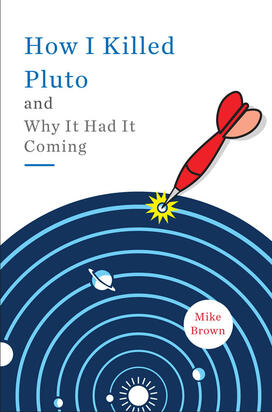A scientist's memoir
Mike Brown ’87 chronicles his discovery of a would-be planet and another’s demise

The career of Mike Brown ’87 is proof that astronomy is no sleepy scientific discipline. In 2005, he was hailed for his team’s discovery of what many believed was a planet in the outer reaches of our solar system. Later, when his finding prompted the International Astronomical Union to define what a planet is, he courted controversy when he argued that if the new object, Eris, was not worthy of the name, then neither was Pluto, which was 27 percent smaller than Eris.
Ultimately, Brown’s discovery led to Pluto’s demotion from the list of accepted planets by the IAU and the creation of a new category, “dwarf planet,” which now includes Pluto and Eris. Brown tells his story with verve and wit in How I Killed Pluto and Why It Had It Coming.
“It seemed very likely to me that Eris was going to be declared a planet, just because I never thought astronomers would have the guts to actually get rid of Pluto,” Brown says. “It took extraordinary courage [for the IAU] to go against what was obviously a huge public outcry.”
The dilemma of what constitutes a planet lies at the heart of Brown’s book. Prior to 2005, the IAU had never issued a formal definition of a planet; its decision to demote Pluto drew widespread protests from devoted fans. The IAU ultimately agreed on a three-part definition, but Brown finds it confusing, and argues against “a precise, lawyerly definition” of a planet. He prefers a simple, if somewhat broad, conceptual approach: “A planet is one of a small number of bodies that dominates a planetary system.”
Brown has been observing planets since he was a teenager, but he didn’t realize he could make a career of it until he attended Princeton. He majored in physics, and his adviser, Jim Peebles *62, convinced him to apply for graduate school in astronomy. Brown obtained his Ph.D. at Berkeley in 1994, a propitious time to enter the field. A team of astronomers recently had discovered the Kuiper Belt, a large section of space beyond Neptune that was ripe for exploration. In 1999, Brown started searching the Kuiper Belt for a new planet.
“There had to be a tenth planet,” Brown writes. “The possibility that Pluto was a unique planetary oddball out at the edge of the solar system seemed absurd to me.”
Over the next five years Brown and his team discovered several objects that they suspected might be larger than Pluto and therefore could be planets. But it wasn’t until they spotted Eris in 2005, that they were said to be correct. (Recently, however, a group of astronomers calculated the width of Eris and concluded that Eris is smaller than Pluto, though Brown is not convinced.)
Brown still is searching for planets, but he acknowledges, “The bar is now much higher.”
“Anything new that wants to be called a planet needs to be a significant presence in our solar system,” he writes, “and I am not certain that there are any more hiding in the sky.”
Maurice Timothy Reidy ’97 is online editor at America magazine.













No responses yet